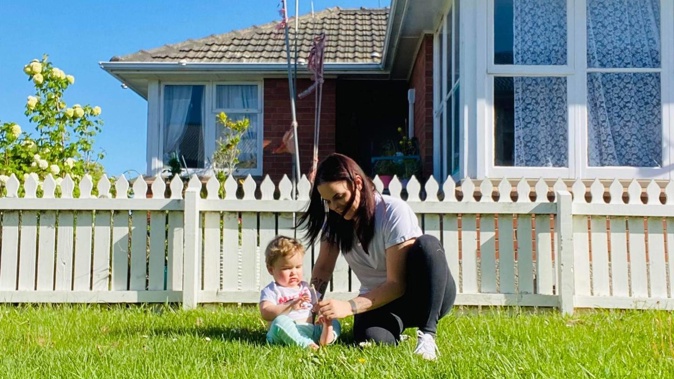
Jess Barnfather has always been a good budgeter. So much so that she had $120 allocated for groceries each week - but now that same shop is costing her more than $200.
She scours supermarket websites for sales and usually visits multiple different shops to find the best deals to keep her costs low, but she is still struggling to make ends meet.
"There's just no extra money now for fun, extra things," she said.
"It seems like, every week, you're spending more and more."
The Invercargill single mother is one of the Kiwis struggling to get by as the costs of essential goods surge. For the September quarter, annual inflation was 7.2 per cent and vegetable prices rose an astonishing 24 per cent.
Three parents spoken to by the Herald amid the cost-of-living crisis say they are worried about how they will stretch their budgets each week to cover essentials with often very little left for the nice-to-have things.
/cloudfront-ap-southeast-2.images.arcpublishing.com/nzme/TLI7GETAA46EPYSU67PSZHKPRY.jpg)
Invercargill mum Jess Barnfather, 26, with her 14-month-old son, Mykah. Photo / Supplied
A new Herald poll showed the global cost-of-living crisis is by far the most important issue for New Zealanders right now – with 56 per cent ranking the issue the most important issue facing the country – well above climate change (12 per cent), crime (11 per cent), the Covid-19 pandemic (8 per cent) and social division (8 per cent).
By gender, higher proportions of women (65 per cent) said the cost-of-living was the most important issue facing the country than men (46 per cent).
Minister of Finance, Grant Robertson, said earlier in the month steps had been taken to ease the living pressures on Kiwis, like halving public transport fees and providing a temporary cost-of-living payment to eligible people.
Barnfather, 26, said she typically spent around $120 per week on food for her and her 14-month-old son, but that increased to around $170-$180 at the start of the year, and then to more than $200 over the last month. She receives a benefit and said she was shocked by the increase.
"I thought, 'wait a minute, I just brought everything on the list.' I had to pay for it because we needed it."
Barnfather said the weekly prospect of ensuring she could cover all her costs, including petrol and childcare, was daunting. Before leaving the house, she says she checks supermarket websites for sales and sometimes visits almost all big supermarkets in town to find the best deals.
/cloudfront-ap-southeast-2.images.arcpublishing.com/nzme/LORC4EWECQGNHUH4YXB47LYO3M.jpg)
Invercargill mum Jess Barnfather, 26, with her 14-month-old son, Mykah. Photo / Supplied
"Every week is a daunting measure. Is there going to be any decent sales on this week? Sometimes there's weeks where there are no sales at all and you have to pay full price for everything.
"In Invercargill, we have two Countdowns, one PaknSave and two New Worlds, and Supervalue and Four Square, and some weeks I go to all of them. Each one in town has different sales."
Learning coach at Auckland's Ormiston Junior College and PPTA branch chairwoman Shontelle Helg said while costs had gone up, her salary had not, stretching her food budget for her and her daughter to its limit.
"Your budget has to be so tight … My pay is not going [up] with the prices of everything so you just have to cut back on everything because I can't afford it like I used to.
"Every now and again you want to buy things like a packet of chocolate biscuits. Well, I can't buy those chocolate biscuits any more because I've got to spend that money on the healthy things that are good for you."
Her daughter's swimming lessons increased from $100 per term to $300, she said, making them unaffordable, but she is able to do dancing and Girl Guides. Helg said for her and her ex-husband, their daughter will always come first.
"As co-parents, we just make sure she has what she needs first. We are both second."
/cloudfront-ap-southeast-2.images.arcpublishing.com/nzme/FS2A63IB4D3RK5PMA3MPI4MBSM.jpg)
Teacher, PPTA member and mother Shontelle Helg. Photo / Dean Purcell.
Michelle*, a Marlborough mother of a blended family with four kids, says she and her partner will often eat less so their children can have more food. Despite her partner working full time, the family is struggling to get by.
"It's really hard just trying to put food on the table at the moment. The money that comes in is pretty much gone; most of it goes to rent and then each week it's like what bills are we going to have to miss paying this week so we can try and get enough food to get through the week?
"We haven't had a whole lot of money coming in, but the last few months it's just gotten harder and harder just to get by."
She said the family's power would have been turned off if they had not gotten a loan from non-profit Nga Tangata Microfinance, which typically provides one-off interest-free loans to people struggling with debt.
Ngā Tāngata Microfinance chief executive Natalie Vincent said applications increased by 37 per cent in the quarter to September 30 compared with the same period last year. And for the first time ever, the number of applicants whose income was a wage or partially a wage outnumbered beneficiaries
"It used be that 80 per cent of applications received were for people whose main source of income was a benefit. We've been watching that change since about June … In September would be the first time that we've actually seen that scale tipped," she said.
"It's quite alarming."
In September, the average income of the wage-earning clients, or clients who earned a wage but also got a benefit top-up, was $59,500, Vincent said.
"What we're seeing is more people who [are] wage, income-earners, they had a credit card, they had an overdraft, they had a personal loan with a bank, they had buy now, pay later, but with the cost of living that has risen, they're also employed they all still have wages, they are no longer able to manage keeping on top of their debt."
*the Herald agreed not to use the woman’s real name.
Take your Radio, Podcasts and Music with you









